|
|
|
Sort Order |
|
|
|
Items / Page
|
|
|
|
|
|
|
| Srl | Item |
| 1 |
ID:
118386
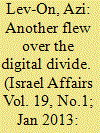

|
|
|
|
|
| Publication |
2013.
|
| Summary/Abstract |
This article is part of a pioneering study which analyses Internet usage by some 600 candidates for heads of 156 local authorities in Israel in the municipal campaigns of 2008. Despite the importance attributed to the municipal elections in the Arab-Palestinian sector in Israel, the high turnout rate, the competitiveness of the elections and the continuing penetration of the Internet, it was scarcely used by candidates, compared to about 50% usage by candidates who competed in municipalities with Jewish populations. Interviews suggest that beyond access gaps, additional obstacles impede the usage of the Internet as an effective political tool in the Arab-Palestinian sector.
|
|
|
|
|
|
|
|
|
|
|
|
|
|
|
|
| 2 |
ID:
149189
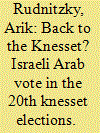

|
|
|
|
|
| Summary/Abstract |
Arab politics in Israel recorded several notable achievements in the March 2015 Knesset elections. Sixteen Arab and Druze candidates were elected to serve in the Israeli parliament, the largest number ever elected. In addition, Arab voter turnout increased significantly compared to previous election campaigns and reached 63.5%, its highest level since the early 2000s, thus reversing a period of political apathy caused by the events of October 2000. These results may indicate a turning point in the political behaviour of the Arab public, and that the Knesset has once again become a relevant arena of political influence for the majority of the Arab public. An analysis of voting patterns in the recent elections in the Arab sector suggests that these changes were spurred by the participation of the Joint List. In many Arab localities, support for the Joint List, which ran as a grouping of the major political parties that have represented the Arab public in recent years, was positively associated with a rising turnout compared to previous elections.
|
|
|
|
|
|
|
|
|
|
|
|
|
|
|
|
| 3 |
ID:
181230
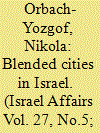

|
|
|
|
|
| Summary/Abstract |
This article presents a new conceptual and theoretical outlook on the municipal-demographic phenomenon of mixed cities, in which minority groups penetrate homogenous spaces. The findings show that the penetration of Jewish cities by Arab minorities in Israel has become widespread – especially in the periphery of the country. While the State and local authorities view this phenomenon as problematic – from a national, municipal, and demographic point of view, their solutions are limited to programmes that encourage increased Jewish residence in these cities to preserve the existing demographic advantage. Many of these mixed cities are characterised by increased tension between Arabs and Jews, decreased socioeconomic status, negative migration balance, and Arab minorities settling in the outskirts of the city or weaker neighbourhoods.
|
|
|
|
|
|
|
|
|
|
|
|
|
|
|
|
| 4 |
ID:
154502
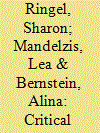

|
|
|
|
|
| Summary/Abstract |
The historic victory of the Arab Bnei Sakhnin Union Football Club in the 2004 Israeli State Cup finals triggered an active public discourse about the Arab sector’s position in Israeli football and in Israeli society in general. The study’s premise is that the victory of an Arab club in the Jewish state’s National Cup games and the events surrounding it outside the football pitch are thematically inseparable. Content analysis of talkbacks on the Ynet online news site revealed the Israeli public discourse about the difficulties and complexities involved in the integration of Arab citizens in a Jewish state.
|
|
|
|
|
|
|
|
|
|
|
|
|
|
|
|
| 5 |
ID:
133746
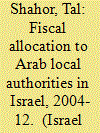

|
|
|
|
|
| Publication |
2014.
|
| Summary/Abstract |
This article measures whether the Israeli government adopted a policy of affirmative action towards the Arab minority during the period 2004-12 within the parameters of local government. Unlike previous research, it focuses only on permanent fiscal allotments and ignores one-off payments. The general trend evident from the findings of this article is one of an increase in fiscal allotments to Arab sector local authorities
|
|
|
|
|
|
|
|
|
|
|
|
|
|
|
|
| 6 |
ID:
131858
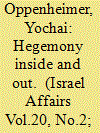

|
|
|
|
|
| Publication |
2014.
|
| Summary/Abstract |
This article examines the political protest expressed by Nathan Alterman over the years in poems published in the newspapers. It argues that this criticism identifies with the hegemonic political values rather than articulate alternative ones, in an attempt to nurture self-criticism on the part of the government regarding its failures and mistakes. This type of criticism seeks to preserve the reigning hegemony from within and to ensure that it projects an image of moral rectitude.
|
|
|
|
|
|
|
|
|
|
|
|
|
|
|
|
| 7 |
ID:
160292
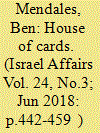

|
|
|
|
|
| Summary/Abstract |
For the first 28 years of Israel’s existence, the Arab minority was represented in the Knesset by a series of ‘satellite lists’ affiliated mainly with the Mapai party and, later, with the Alignment (Labour). This article explores the role of the satellite lists in the early years of the state, and the reasons for their ultimate demise. The fate of these lists would be inextricably tied to the overall political development and political liberation of their constituencies. Their relative success was intimately connected to the disarray of Palestinian Arab society after the 1948 war, the political isolation of the Arab minority and a belief held by the Jewish leadership that the traditional Arab notability could be co-opted. The satellite lists could not survive for long once these factors were mitigated and a more authentic alternative leadership had evolved.
|
|
|
|
|
|
|
|
|
|
|
|
|
|
|
|
| 8 |
ID:
118385
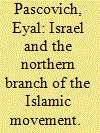

|
|
|
|
|
| Publication |
2013.
|
| Summary/Abstract |
The Israeli Islamic Movement's Northern Branch and its leader Sheikh Ra'id Salah pose a complex and multi-dimensional challenge for the State of Israel: political, national, socioeconomic and religious. Its most prominent manifestation is the movement's striving for separatism and open defiance of Israel's Jewish character. The government has sought - with limited success - to draw 'red lines' for the movement and its leaders and its occasional threats of harsher measures, including outlawing the movement, have failed to achieve the desired result.
|
|
|
|
|
|
|
|
|
|
|
|
|
|
|
|
| 9 |
ID:
118382
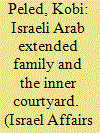

|
|
|
|
|
| Publication |
2013.
|
| Summary/Abstract |
This article presents significant transformations in the social history of the Israeli Arab extended family as reflected in the architectural history of the inner courtyard - once the focal point of the extended family's economic and social life. The article places this socio-architectural perspective within its broad political, economic and demographic contexts. As an interdisciplinary study in the sociology of space, it weaves together anthropological insights regarding social structures and processes and geographical explanations of the rapid changes in the landscape of Israeli Arab villages, towns, and cities.
|
|
|
|
|
|
|
|
|
|
|
|
|
|
|
|
| 10 |
ID:
187065
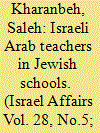

|
|
|
|
|
| Summary/Abstract |
Recently there has been a growing tendency among Israeli Arab teachers to work in Jewish schools. This trend has several sociopolitical and economic reasons but is generally viewed as a welcome development that should be encouraged. Based on interviews with ten Arab teachers in Jewish schools, this article seeks to delve into their living experience and understand their motivations and aspirations, as well as the obstacles they encounter. Its findings underscore two main obstacles that need to be surmounted: cultural differences and lower mastery of the Hebrew language, on the one hand, and the tension attending a different ethnic/national identity from that of the taught audience, on the other.
|
|
|
|
|
|
|
|
|
|
|
|
|
|
|
|
| 11 |
ID:
118383
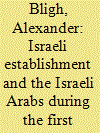

|
|
|
|
|
| Publication |
2013.
|
| Summary/Abstract |
It is impossible to assess the Israeli government activity vis-à-vis the Israeli Arabs during the 1987-92 uprising in the West Bank and Gaza as a success. In terms of policies of active initiative, there were none. Two ministers did take active measures in addressing the development gaps, but that did not deal with the issue of preventing the emergence of a de facto Israeli Arab autonomous system. In shaping passive policies, the response was far from conveying the message to the Israeli Arabs that as full Israeli citizens they were expected to keep a distance from organizations dedicated to the destruction of the Jewish state.
|
|
|
|
|
|
|
|
|
|
|
|
|
|
|
|
| 12 |
ID:
118384
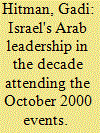

|
|
|
|
|
| Publication |
2013.
|
| Summary/Abstract |
This main thesis of this article is that while there is a general unanimity among Israel's Arab parties and/or organizations on national issues and the desired solution to the Palestinian problem, there are wide divergences in their positions on civil matters and the consequent need for a dialogue with the Israeli government and Jewish society. A governmental policy that encourages integration rather than exclusion can therefore minimize the tension between this sector and the state and neutralize potential sources of friction.
|
|
|
|
|
|
|
|
|
|
|
|
|
|
|
|
| 13 |
ID:
118379
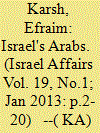

|
|
|
|
|
| Publication |
2013.
|
| Summary/Abstract |
The violence wrought by Israel's Arabs on their Jewish compatriots in October 2000 was not an act of social protest as wrongly claimed by the Orr commission, but rather an internal uprising in support of an external attack. Just as the leader of the Palestinian Arabs during the mandate era, Hajj Amin Husseini, dragged his reluctant constituents into a disastrous conflict that culminated in their collective undoing, and Yasser Arafat used the Oslo accords to implicate his equally grudging subjects in the worst military confrontation with Israel since the 1948 war, rather than create the independent Palestinian state envisaged by the accords, so Israel's Arab leaders radicalized their community for decades. The more prosperous, affluent, and better educated the Israeli Arabs have become, the greater has grown their leadership's incitement against their state of citizenship, to the point where many ordinary Arabs have come to openly challenge the fundamental principles underpinning its very existence.
|
|
|
|
|
|
|
|
|
|
|
|
|
|
|
|
| 14 |
ID:
118381
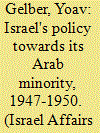

|
|
|
|
|
| Publication |
2013.
|
| Summary/Abstract |
In the absence of preconceived strategies - despite several pre-state attempts to prepare blueprints for tackling the Arab problem - Israel's early Arab policy was shaped in a process of trial and error, fluctuating between ideological aspirations and good intentions (or wishful thinking) and the needs on the ground: the 1948 war and its consequences, the wide-open borders and regular infiltration, and the fear of a second comprehensive war with the Arab states.
|
|
|
|
|
|
|
|
|
|
|
|
|
|
|
|
| 15 |
ID:
175469
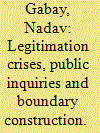

|
|
|
|
|
| Summary/Abstract |
This article examines the Or Commission of Inquiry and the discursive invention of the ‘October 2000 disturbances’ by offering a reconceptualisation of the Green Line function in the context of the Israeli state ideology (mamlachtiut). The commission presents an interesting case of a State Commission of Inquiry working under unprecedented lack of public and political legitimacy and of government support. By applying a sociopolitical perspective, the article analyzes the Or Commission not simply as a neutral administrative instrument but as a political actor that sought to enhance its legitimacy and influence public opinion and decision-makers by deviating considerably from its official mandate.
|
|
|
|
|
|
|
|
|
|
|
|
|
|
|
|
| 16 |
ID:
143622
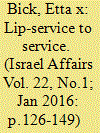

|
|
|
|
|
| Summary/Abstract |
This article explores the social and political dynamics behind the various legislative proposals to establish a civic national service programme in Israel, and the role of Israel’s High Court as a catalytic force for changing policy on this controversial issue. The idea of civic national service for those not inducted into the Israel military has been a controversial issue in Israel since the early years of the state. While Jews and Druze were inducted into the armed forces, Israeli Arabs, religious women and ultra-orthodox yeshiva students were either exempted or deferred from service. Members of Knesset primarily from small parties in the opposition proposed private member bills to establish an alternative civic service for those not serving in the army; however, Israel’s governments rejected these proposals and only in the case of religious Zionist women did the government establish a voluntary programme. Political considerations and coalition politics as well as an interest in protecting the unrivalled predominance of the military (IDF) in Israeli society led successive Israeli governments to maintain the status quo. Only the intervention of the High Court obliged the government to review its policy and take action.
|
|
|
|
|
|
|
|
|
|
|
|
|
|
|
|
| 17 |
ID:
118388
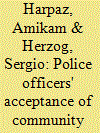

|
|
|
|
|
| Publication |
2013.
|
| Summary/Abstract |
Police racism and prejudice against minorities are believed to impede law enforcing agencies' ability to equitably perform their job. One factor driving police forces throughout the world to adopt community policing was their will to ameliorate relations with minority groups. In the Israeli case, a survey of 643 police officers and police managers reveals that positive attitudes towards community policing correlate with positive attitudes towards Arab citizens. This article discusses these findings and their implications.
|
|
|
|
|
|
|
|
|
|
|
|
|
|
|
|
| 18 |
ID:
118380
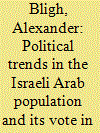

|
|
|
|
|
| Publication |
2013.
|
| Summary/Abstract |
Full Arab Israeli involvement in the national political system is disappearing from the Israeli political scene. A parallel system is being developed by the community's political leaders. Within this new structure, national elections and the Knesset are viewed as marginal; they serve mainly as a PR arena intended to bring the Arab Israeli message to Jewish/Zionist awareness. Judging from the evidence of recent election results among Arab voters, it is possible to cautiously conclude that the Israeli Arab political stance is less and less a part of the general Israeli political culture.
|
|
|
|
|
|
|
|
|
|
|
|
|
|
|
|
| 19 |
ID:
171683
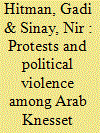

|
|
|
|
|
| Summary/Abstract |
This article seeks to understand the extent of Arab MKs’ involvement in protests and political violence over the past decade. By way of doing so, it will examine this phenomenon in four case studies: Mavi Marmara Flotilla (2010), Operation Pillar of cloud (2012), Operation Protective Edge (2014), and the passing of Israel’s Nation-State law in 2018. The findings reveal that, unlike many other protests in the Arab world, Arab Israeli protest in the examined case studies were neither based on economic inequality nor related to civil society issues but were rather a corollary of nationalist radicalisation. A dangerous trend of anti-Semitism was also detected among Israel’s Arab leaders.
|
|
|
|
|
|
|
|
|
|
|
|
|
|
|
|
| 20 |
ID:
187563
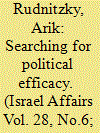

|
|
|
|
|
| Summary/Abstract |
Arab politics experienced dramatic upheavals in the four Knesset elections between April 2019 and March 2021. First was the jump from a significant low turnout among Arab voters in April 2019 (49.2%) to the highest turnout in two decades in March 2020 (64.8%), only to be followed by a historic slump to 44.6% in March 2021. The Arab parties went through a shaky period – from a divided political system that secured only 10 Knesset seats in April 2019 to a historic achievement in the March 2020 elections, when the Joint List won 15 seats, followed by yet another schism resulting in a total of 10 seats in the March 2021 elections. As such, the Joint List’s achievements did not herald the strengthening of the Arab parties’ influence in the Arab street but rather the increasing influence of the public on the political configuration of the parties wishing to represent it. The interrelation between the public and the parties is the outcome of profound processes of political change that Arab society in Israel has undergone over the past two decades. The article discusses these processes and their impact on the political behaviour of the Arab public.
|
|
|
|
|
|
|
|
|
|
|
|
|
|
|
|
|
|
|
|
|